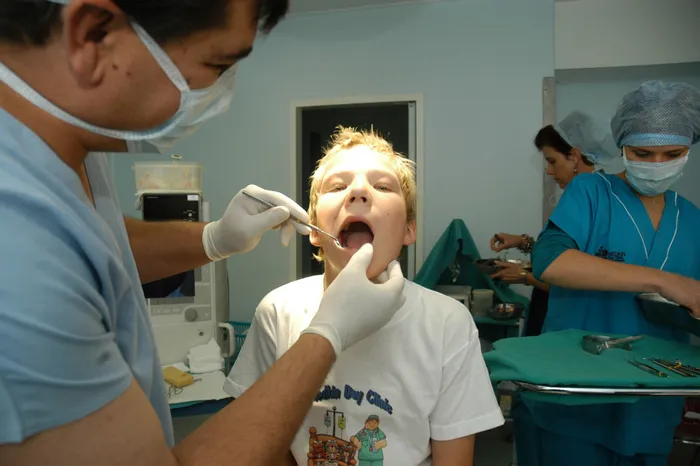Do you know how healthy your gums are?

PRESIDENT of the Northern Gauteng branch of the SA Dental Association Dr Ian Erasmus from Medkin Day Clinic is offering free dental treatment to orphans like Markus Suurd, 11, in recognition of Oral Health Month. Picture: Phill Magakoe
September is National Oral Health Month, an opportune time to shine a light on gum disease — a critical but often overlooked health issue.
In South Africa, gum disease ranks second only to the common cold in terms of prevalence, with an estimated 90% of South Africans experiencing it at some point. The World Health Organization (WHO) lists oral diseases as among the most common non-communicable diseases globally, affecting an estimated 3.5 billion people. The burden is increasing, particularly in low- and middle-income countries.
Research links gum disease to a range of serious health issues including Alzheimer’s, cardiovascular disease and infertility. Better oral health has been shown to improve outcomes for pregnant women and people suffering from arthritis, diabetes and other systemic diseases.
Dirna Grobbelaar, oral hygiene adviser for Ivohealth and a member of the Oral Hygienists Association of South Africa, said most people don’t realise they have gum disease.
“Although the symptoms can be subtle, gum disease is a serious condition that can precipitate a cascade of other health issues."
Visible signs include redness, swelling or bleeding gums.
“Bleeding gums are never ‘normal’. You may attribute bleeding gums to using the ‘wrong’ brush or floss; in most cases, bleeding gums indicate gingivitis, the early form of gum disease.”
Fortunately, gingivitis can be treated and is reversible. If untreated, it can develop into a more serious form of gum disease – periodontitis — which can lead to bone and tooth loss.
“Gum disease is best prevented, and the earlier you intervene, the better,” said Grobbelaar.
Some people are at higher risk of developing gum disease. This includes diabetics, anyone who experiences “dry mouth” (medically known as xerostomia) and those with a family history of oral issues. “Gum disease can run in families. If your parents or siblings have been diagnosed with gingivitis or periodontitis, you might have a higher risk of developing it too,” explained Grobbelaar.
“It’s important to be aware of your family history and take extra care with your oral hygiene. Regular dental check-ups can help catch early signs of gum issues.”
Preventing gum disease involves eating a balanced diet and maintaining an effective daily oral care routine.
“Even the best brusher can miss areas. In addition to daily oral care, have a professional clean, ideally every six months, to remove any plaque or tartar you have missed.”
Grobbelaar recommends EMS Guided Biofilm Therapy®, a revolutionary oral hygiene treatment from Switzerland that is gentler and more effective than traditional methods.
If caught early, you may be able to “treat” gum disease at home. Grobbelaar says if you notice any sensitivity or bleeding, follow this meticulous oral hygiene routine for a week:
1. Brush twice a day for at least 2 minutes each time. Use a soft brush with a small head, like the GUM Pro Sensitive Ultra Soft, and a treatment toothpaste, like GUM Paroex Intensive Action toothpaste.
2. Clean between the teeth daily, using floss, an interdental brush or Soft-Picks. If you find flossing too difficult, try an oral irrigator.
3. Lastly, rinse with an alcohol-free mouthwash like GUM Paroex Intensive Action to help reduce plaque and soothe sensitive and irritated gums.
Saturday Star
Related Topics: